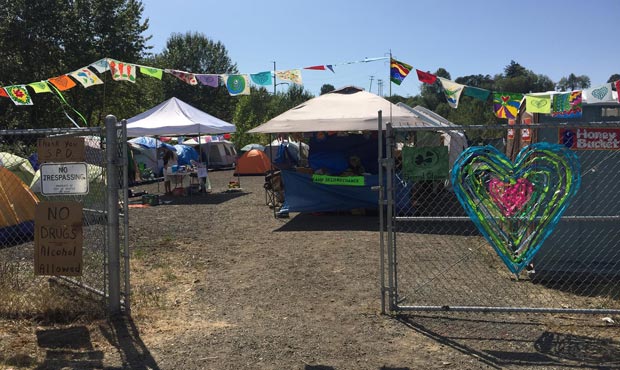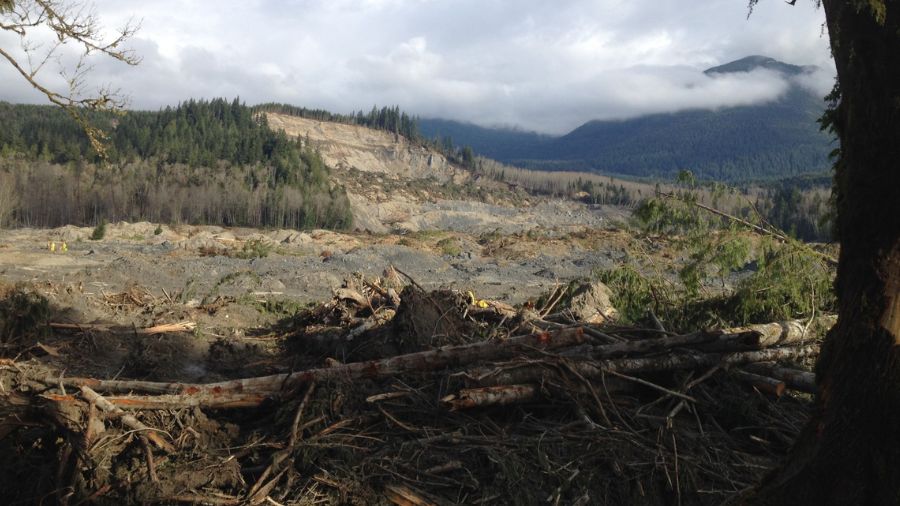Does Camp Second Chance have a chance in Seattle?
Aug 7, 2016, 12:11 AM | Updated: Aug 8, 2016, 12:20 pm

Camp Second Chance sits off of Meyers Way in Seattle on surplus city land. (Courtesy of Polly Trout)
(Courtesy of Polly Trout)
Should they stay or should they go? They were told if they stayed there would be trouble. Now, that’s not so clear. Does Camp Second Chance have a chance in Seattle?
Camp Second Chance was told by Seattle officials it had to move off of surplus city land last week — mainly because the camp is not permitted to be on the public land near Meyers Way in the southern stretches of the city. In fact, Polly Trout, a volunteer community organizer who serves the camp, admits to cutting through the lock on the gate to the area, opening the fences to erect tents and portable bathrooms on the site.
“(Camp) Second Chance does not have permission from the city to be at its current site,” Trout said. “The site was locked with a chain, which I cut.”
Related: Camp Dearborn, aka Nickelsville, defies city eviction
Crews removed their portable toilets after the City of Seattle told campers they had to leave — but they were soon returned, KING 5 reports. Residents of the camp told KING 5 that they are confused by the city’s desire to sweep them out, arguing that Seattle allows people to live in the Jungle under I-5 where it is known that crime and drug use are common. Their camp, they say, is a sober, self-governing organization with many who seek housing.
The city’s eviction decision was changed by Wednesday, according to Trout.
“The city is postponing a sweep of (Camp) Second Chance for at least a few weeks,” Trout said.
The city, however, has a bit of a different perspective on the matter. According to a an official with Seattle’s Human Services Department:
There is no agreement between the City and the campers. The cleanup of the encampment that has established itself within the fenced area of the Myers Way property has been deferred to later this month due to coordination with the overall encampment cleanup schedule. We do not have a set date for cleanup at this time, but will follow the City’s encampment cleanup process and post notification 72 hours in advance of the scheduled cleanup. HSD will provide outreach services to those living at the encampment.
Locals have even started to weigh in on the issue and started a Facebook group to support the unauthorized camp. In either case, it seems that the camp is not slated to stay too long on Meyers Way.
Camp Second Chance was previously located on a local church’s site, but the lease with the church ran out and they scrambled to find a temporary location until a new lease with the church could be formed. The return to the church land is expected next year. But in the meantime, the camp has settled on the city land with 25 adults, one toddler, and two dogs.
Camp Second Chance is now hunting for a new location. But if they can’t find one, or the city moves them out of their site on Meyers Way, Trout said they will likely find another spot — on city land.
“The camp is currently looking for a host site with a permit, but will be staying on vacant public land until a permitted site is secured,” she said. “If the camp is removed from this particular unused public lot before they have a permitted site, they will move to a different unused public lot without permission.”
Camp Second Chance
Camp Second Chance is a sober, self-governed camp. When SHARE lost funding this year, many of the people from that program went their own way and formed the camp. A similar situation happened when Camp Dearborn lost sponsors this year, and campers split off to form Camp Liberty — though the two are not related. Trout of Patacara Community Services has been has been providing support to both camps.
“Most of the people in it are working and saving money to move into housing,” Trout said. “A few are disabled and wait listed for housing. There is an elected leadership core group and weekly camp meetings to vote on things.”
Trout said that other social services organizations have been in contact with residents from the camp, such as Evergreen Treatment Services – Reach and All Home’s program Coordinated Entry for All to get the campers health insurance and health services.
“Everyone in the camp wants housing and we are trying to figure out how they can move from the camp to permanent housing without having to go through the shelter system,” Trout said. “I’m pretty sure everyone in camp has stayed in a shelter at some point but found that it does not work for them. ”
The city site at the center of the issue, was reportedly among a handful of surplus plots of land that Seattle considered selling last year to fund homeless programs.



















